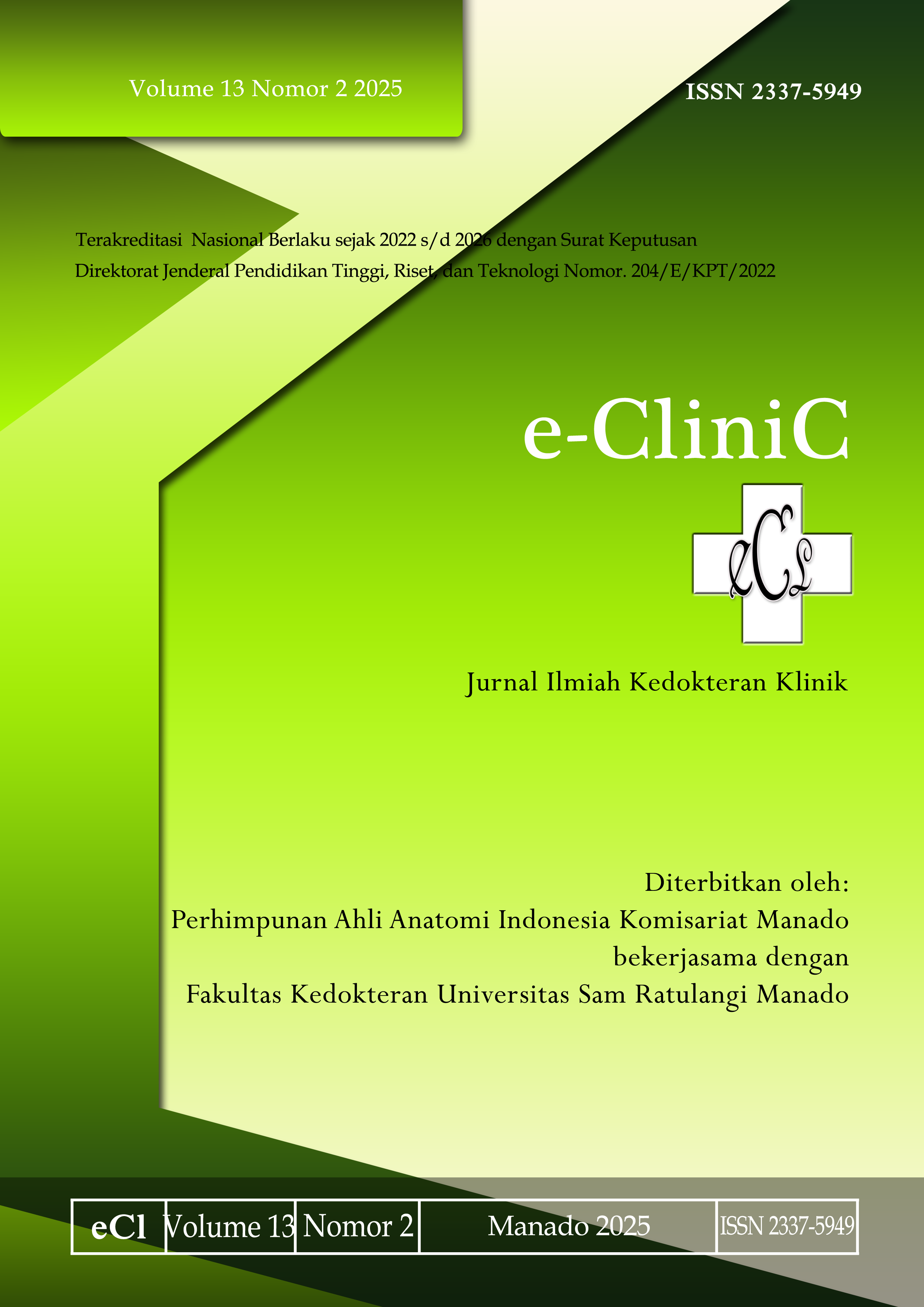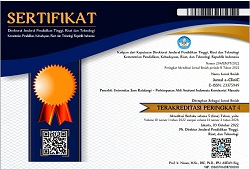Hubungan Kadar Kalium dengan Tekanan Darah pada Pasien Hipertensi
DOI:
https://doi.org/10.35790/ecl.v13i2.60871Abstract
Abstract: Potassium is an intracellular cation in the body that controls the function of nerve and muscle cells, especially heart muscle, maintains water balance in the body, and regulates blood pressure. Potassium also reduce tension in blood vessel walls, which in turn lowers blood pressure. This study aimed to evaluate the relationship between potassium level and blood pressure in patients with hypertension. This was an observational and analytical study with a cross sectional design using medical records of 154 hypertensive patients at ODSK Regional Hospital, North Sulawesi Province from April 2022 – September 2023. The results showed that 55-64 years (31.2%) was the most dominant age group. There were more female patients (52.6%) than male patients (47.4%). The majority of patients suffered from hypertension grade 2 (60.4%), and had normal potassium level (55.8%). The Spearman correlation test showed a positive significant correlation between potassium evel and systolic blood pressure (p=0.035; r=0.170), but not with diastolic blood pressure (p=0.099). In conclusion, there is a significant relationship between potassium level and systolic blood pressure, but not with diastolic blood pressure in patients with hypertension.
Keywords: potassium level; hypertension; systolic blood pressure; diastolic blood pressure
Abstrak: Kalium merupakan kation intrasel dalam tubuh yang mengontrol fungsi sel saraf dan otot, terutama otot jantung, menjaga keseimbangan air dalam tubuh, dan mengatur tekanan darah. Kalium juga membantu mengurangi ketegangan di dinding pembuluh darah, yang selanjutnya menurunkan tekanan darah. Penelitian ini bertujuan untuk mengetahui hubungan kadar kalium dengan tekanan darah pada pasien hipertensi. Jenis penelitian ialah analitik observasional dengan desain potong lintang. Data penelitian diambil dari rekam medis 154 pasien hipertensi di RSUD ODSK Provinsi Sulawesi Utara periode April tahun 2022–September 2023. Hasil penelitian mendapatkan kelompok usia 55–64 tahun (31,2%) yang terbanyak dibandingkan kategori usia lainnya. Pasien berjenis kelamin perempuan (52,6%) lebih banyak daripada laki-laki (47,4%). Majoritas pasien berada pada hipertensi derajat 2 (60,4%) dan memiliki kadar kalium normal (55,8%). Hasil uji korelasi Spearman menunjukkan adanya korelasi positif yang bermakna antara kadar kalium dengan TDS (p=0,035; r=0,170), namun tidak terdapat hubungan bermakna antara kadar kalium dengan TDD (p=0,099). Simpulan penelitian ini ialah terdapat hubungan bermakna antara kadar kalium dengan tekanan darah sistolik, namun tidak dengan tekanan darah diastolik. Pada pasien dengan hipertensi
Kata kunci: kadar kalium; hipertensi; tekanan darah sistolik; tekanan darah diastolik
References
WJ Marshall, Lapsley M, Day A, Shipman K. Water, sodium and potassium. In: Clinical Chemistry (9th ed). Missouri: Elsevier; 2021. p. 25–53.
Edwards MR, Grocott MPW. Perioperative fluid and electrolyte therapy. In: Miller’s Anesthesia (9th ed). Elsevier Inc.; 2023. p. 1480-523.
Schonberger RB. Fluid, electrolyte, and acid-base disorders. In: Stoelting’s Anesthesia and Co-Existing Disease (8th ed). Elsevier Inc.; 2023. p. 397–414.
McGee S. Blood pressure. In: Evidence-Based Physical Diagnosis (5th ed). Philadelphia: Elsevier; 2023. p. 119–31.
Hall JE, Granger JP, do Carmo JM, da Silva AA, Dubinion J, George E, et al. Hypertension: physiology and pathophysiology. Compr Physiol. 2012;2(4):2393-442. Doi: 10.1002/cphy.c110058
World Health Organization. Hypertension [Internet]. 2023 [cited 2023 Aug 16]. Available from: https://www.who.int/news-room/fact-sheets/detail/hypertension
Kementerian Kesehatan RI. Laporan Nasional Riskesdas 2018. Jakarta: Perpustakaan Badan Kebijakan Pembangunan Kesehatan; 2020. Available from: https://repository.badankebijakan.kemkes.go.id/id/eprint/3514/
Badan Pusat Statistik Kota Manado. Jumlah Kasus 10 Jenis Penyakit Terbanyak di Kota Manado 2020. Manado; 2021. Available from: https://manadokota.bps.go.id/indicator/30/139/1/jumlah-kasus-10-jenis-penyakit-terbanyak-di-kota-manado.html
Prabhakaran AP, Anandan H. Serum sodium and potassium in newly diagnosed essential hypertensive patients. Ann Int Med Dent Res. 2018;4:(3):60–3. Doi: 10.21276/aimdr.2018.4.3.me15
Mane AS. Correlation between serum sodium and potassium levels and risk of developing hypertension. Int J Contemp Med Res. 2018;5(11):K5-K9. Available from: http://dx.doi.org/10.21276/ijcmr.2018.5.11.15
Cheteu-Wabo TM, Wu X, Sun C, Boah M, Ngo NVR, Cheruiyot JK, et al. Association of dietary calcium, magnesium, sodium and potassium intake and hypertension: a study on an 8-year dietary intake data from The National Health and Nutrition Examination Survey. Nutr Res Pract. 2022;16(1):74–93. Doi: 10.4162/nrp.2022.16.1.74
Yunus M, Aditya IWC, Eksa DR. Hubungan usia dan jenis kelamin dengan kejadian hipertensi di Puskesmas Haji Pemanggilan Kecamatan Anak Tuha Kabupaten Lampung Tengah. J Ilmu Kedokt Kesehat. 2021;8(3):229–39. Available from: https://doi.org/10.33024/jikk.v8i3.5193
Patel H, Kyung S, Fugar S, Goldberg A, Madan N, Williams KA. Hypertension in Older adults: assessment, management, and challenges. Clin Cardiol. 2020;43:99–107. Doi: 10.1002/clc.23303
Chaudhary P, Pandey A, Azad CS, Tia N, Singh M, Gambhir IS. Association of oxidative stress and endothelial dysfunction in hypertension. Anal Biochem. 2020;590:113535. Available from: https://doi.org/10.1016/j.ab.2019.113535
Maria G, Cunha M, Mayara E, Silva L, Gouv F, Gonzaga L, et al. Nitric oxide as a central molecule in hypertension: focus on the vasorelaxant activity of new nitric oxide donors. Biology (Basel). 2021;10(10):1-26. Doi: 10.3390/biology10101041
Banecki KMRM, Dora KA. Endothelin-1 in health and disease. Int J Mol Sci. 2023;24(14):1-26. Available from: https://doi.org/10.3390/ijms241411295
Pebrisiana, Tambunan LN, Baringbing EP. Hubungan karakteristik dengan kejadian hipertensi pada RSUD dr. Doris Sylvanus Provinsi Kalimantan Tengah. J Sur Med. 2022;8(3):176-85. Available from: https://doi.org/10.33084/jsm.v8i3.4511
Pratama YY. Factors associated with hypertension among postmenopausal women in Parangtritis Coastal Area in Bantul, Yogyakarta, Indonesia. Epidemiol Soc Heal Rev. 2021;3(2):10–6. Available from: https://doi.org/10.26555/eshr.v3i2.3801
Purwanto DS, Mewo YM, Jim EL, Laloan RJ, Engka JNA, Kepel BJ. The analysis of electrolyte levels on hypertensive patients in Noongan Regional General Hospital North Sulawesi Indonesia. Sci J Clin Med. 2019;8(5):54-60. Doi: 10.11648/j.sjcm.20190805.12
Solikin, Muradi. Hubungan kadar kolesterol dengan derajat hipertensi pada pasien hipertensi di Puskesmas Sungai Jingah. J Kep Suaka Insan. 2020;5(1):143-52. Available from: https://doi.org/10.51143/jksi.v5i1.230
Chasanah SU. The relationship between physical activity and the degree of hypertension in the elderly at Berbah Puskesmas Sleman. J Kesehat Masy. 2022;9(2):119–24. Doi: 10.31602/ann.v9i2.6683
Fitri Y, Rusmikawatih, Zulfah S, Nurbaiti. Asupan natrium dan kalium sebagai faktor penyebab hipetensi pada usia lanjut. Aceh Nutr J 2018;3(2):158–63. Doi: 10.30867/action.v3i2.117
Kumar V, Abbas AK, Aster JC. Blood vessels. In: Robbins and Cotran Atlas of Pathology (10th ed). Philadelphia PA: Elsevier; 2021. p. 485–525.
Li JG, Li G, He L. Correlation of serum sodium, serum potassium concentrations and their ratios with blood pressure in elderly patients. Res Sq J. 2022:1–16. Available from: https://doi.org/10.21203/rs.3.rs-2357963/v1
Lakkis JI, Weir MR. Hyperkalemia in the hypertensive patient. Curr Cardiol Rep. 2018;20(2):12. Doi: 10.1007/s11886-018-0954-2
Sarnowski A, Gama RM, Dawson A, Mason H, Banerjee D. Hyperkalemia in chronic kidney disease: links, risks and management. Int J Nephrol Renovasc Dis. 2022;15:215–28. Doi: 10.2147/IJNRD.S326464
Nagar R, Malviya DK, Indurkar M. Correlation between estimated glomerular filtration rate and serum electrolytes in chronic kidney disease patients. ASIAN J Med Sci. 2023;14(6):93–8. Available from: https://doi.org/10.3126/ajms.v14i6.51859
Ku E, Lee BJ, Wei J, Weir MR. Hypertension in CKD: Core Curriculum 2019. Am J Kidney Dis. 2019;74(1):120–31. Doi: 10.1053/j.ajkd.2018.12.044.
Rahman AR, Awang H, Sulaiman SAS. Hyperkalemia in patients with type 2 diabetes mellitus: risk factors and clinical outcomes. Eur J Clin Med. 2023;4(4):18–24. Doi: 10.24018/ejclinicmed.2023.4.4.291
Goia-nishide K, Coregliano-ring L. Hyperkalemia in Diabetes mellitus setting. Diseases. 2022;10(2):1–17. Doi: 10.3390/diseases10020020
Sidhu K, Sanjanwala R, Zieroth S. Hyperkalemia in heart failure. Curr Opin Cardiol. 2020;35(2):1–5. Doi: 10.1097/HCO.0000000000000709
Thomsen RW, Nicolaisen SK, Hasvold P, Garcia-Sanchez R, Pedersen L, Adelborg K, et al. Elevated potassium levels in patients with congestive heart failure: occurrence, risk factors, and clinical outcomes a Danish Population-Based Cohort Study. J Am Heart Assoc. 2018;7(11):1-15. Doi: 10.1161/JAHA.118.008912
Barche B, Dzudie A, Moor VA, Azabji MK, Stanis F, Messaline F, et al. Prevalence and associated factors of hypokalemia in hypertension: the perspective in a low to middle-income setting. J Xiangya Med. 2020;5(34):1–8. Doi: 10.21037/jxym.2020.03.02
Bhatt DL. Which blood pressure number matters most? Harvard Health Publishing. 2021 [cited 2024 Jan 7]. Available from: https://www.health.harvard.edu/heart-health/which-blood-pressure-number-matters-most
Downloads
Published
How to Cite
Issue
Section
License
Copyright (c) 2025 Jessica C. Watulingas, Murniati Tiho, Diana S. Purwanto

This work is licensed under a Creative Commons Attribution-NonCommercial 4.0 International License.
COPYRIGHT
Authors who publish with this journal agree to the following terms:
Authors hold their copyright and grant this journal the privilege of first publication, with the work simultaneously licensed under a Creative Commons Attribution License that permits others to impart the work with an acknowledgment of the work's origin and initial publication by this journal.
Authors can enter into separate or additional contractual arrangements for the non-exclusive distribution of the journal's published version of the work (for example, post it to an institutional repository or publish it in a book), with an acknowledgment of its underlying publication in this journal.
Authors are permitted and encouraged to post their work online (for example, in institutional repositories or on their website) as it can lead to productive exchanges, as well as earlier and greater citation of the published work (See The Effect of Open Access).







